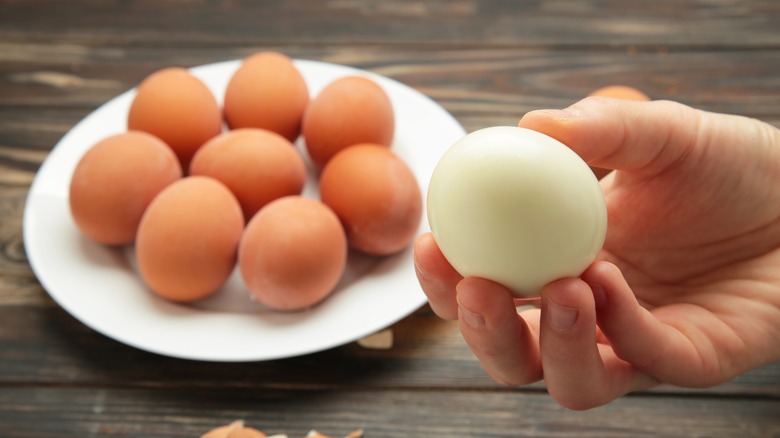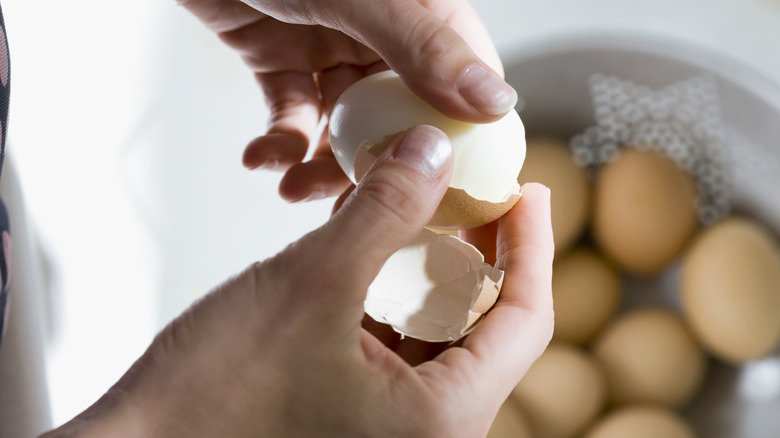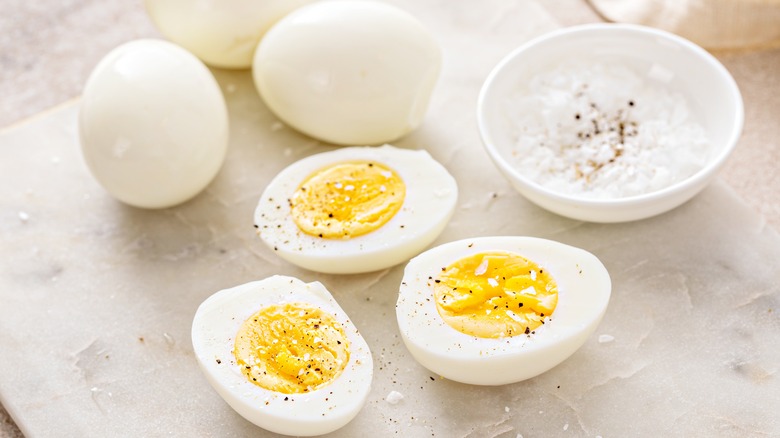Why You Should Be Steaming Hard-Boiled Eggs
Peeling a hard-boiled egg is the bane of every egg lover's existence. Sometimes you get the shell to slide off effortlessly, but more often than not, you're left picking off tiny fragments, or worse, losing entire chunks of egg white to that pesky membrane that won't come off. There's a simple fix to this common conundrum, and it's as simple as grabbing a steamer basket and using that to cook your eggs.
The most annoying part about the peeling step is the thin membrane that stubbornly sticks to the egg. There are a couple of reasons why steaming helps with this headache, and it's mostly to do with temperature. Unlike water, steam is able to get under the shell of an egg and form a slight barrier between the white and the shell. This tiny steam layer makes the membrane attach to the inside of the shell, and not the egg white itself.
It's also important to cook eggs at a consistent, hot temperature, so the proteins in the whites solidify quickly and don't have time to grab onto the membrane. Steam maintains its temperature consistently, and doesn't experience fluctuations the way water does. Dropping a cold or room-temperature egg into boiling water will lower the water's temperature, but has no effect on steam. This more even cooking process results in easier-to-peel shells and saves you a ton of effort.
How to steam your eggs
To steam eggs, add about an inch or two of water to the bottom of a pot, depending on the size of the vessel. Bring the water to a boil, and then add your eggs to a steamer basket, place it inside, and cover the pot. Leave them be for about 12 minutes for a full hard boil, and around six minutes for more of a soft-boiled egg consistency. The total time may vary slightly, depending on the size of the eggs and how many there are in the basket. You might want to test one of the eggs to see if the others need more time (and when peeling them is this effortless, that's an easy task).
Once the time is up, immediately drop the eggs into an ice bath to stop the cooking process, or they could wind up overdone. Once the eggs have cooled down (which takes 10 minutes or so), go ahead and tap the shell on a flat surface to begin the peeling process, and watch the magic happen. An added bonus to steaming is that there is less of a risk the eggs spontaneously cracking and the white leaking out. The method results in eggs that aren't mangled from peeling or from uneven cooking — perfect for deviled eggs or other party dishes where the presentation is half the battle.
Other hard-boiled egg hacks
There are other tips and tricks to help you achieve the perfect hard-boiled egg. Some you can add on to your newfound steamer trick, while others stand as solid alternative methods. If you don't own a steamer, another tried-and-true trick for keeping the membrane away from the egg white is to add vinegar to the boiling water. Much like how a consistently hot temperature will help the egg white solidify, so will a bit of acidity. Vinegar can also make the shell easier to peel by breaking down its composition a bit.
You can also try minimizing temperature fluctuations by starting the eggs in cold water, then bringing the water and eggs up to a boil together. This method may result in a more tender egg white, too. If you don't feel like taking the extra step of preparing an ice bath (a quick cooling also helps with easy peeling), you can simply run the eggs under cold water. They will be too hot to handle with your bare hands, so use a pair of tongs to hold one egg at a time under the faucet, or dump the hot water out of the pot (making sure not to lose an egg!) and add a steady stream of cold water in.



